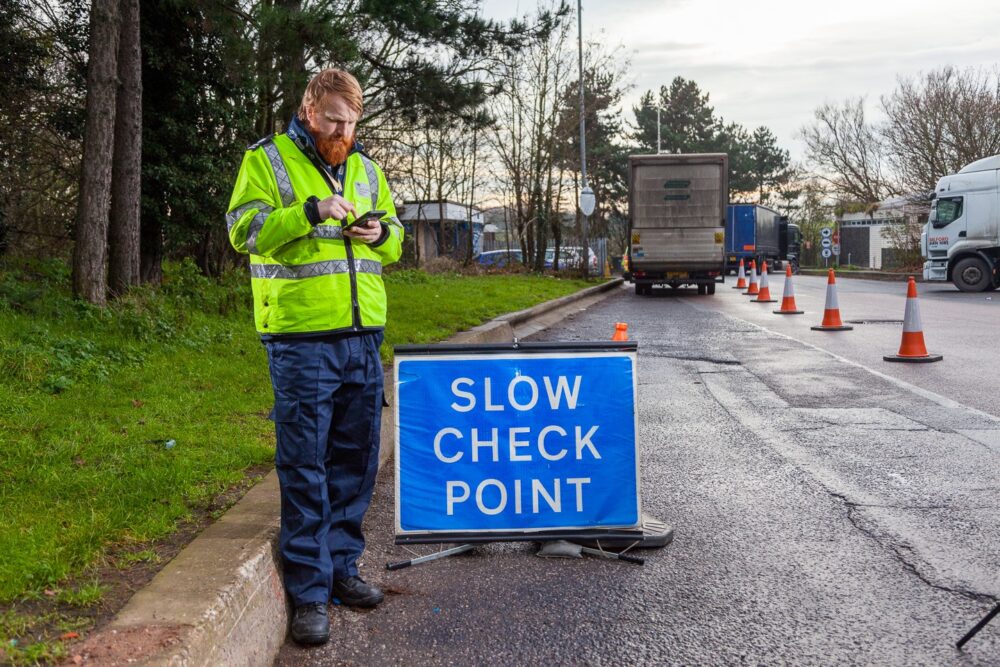See for yourself how Quartix works with our fully interactive real-time demo.
DVSA roadside checkpoints are an essential part of keeping the UK’s roads safe. These inspections ensure vehicles are roadworthy, compliant with regulations, and not posing risks to other road users. For operators of HGVs and commercial vehicles, understanding what happens at these checkpoints and how to prepare can save time, money, and reputation.

What Happens at a DVSA Checkpoint?
During a checkpoint, DVSA inspectors may pull over vehicles to carry out a thorough examination. This could involve inspecting the vehicle itself, reviewing driver documentation, and asking questions about the journey or load.
Northants Police’s Operation Journey provides a great real-world example of what these checks involve.
What DVSA Inspectors Look For
Inspectors focus on several key areas, including:
- Emissions Compliance: As emissions standards tighten, this is becoming a bigger focus.
- Vehicle Weight: Ensuring the vehicle isn’t overloaded.
- Roadworthiness: Inspecting brakes, tires, lights, mirrors, and overall mechanical condition.
- Load Security: Verifying that loads are properly secured to prevent accidents.
- MOT Compliance: Checking that vehicles have valid and up-to-date MOT certificates.
- Tachograph Records: Confirming compliance with driving hours and rest periods.
- Driver Licensing: Ensuring the driver holds the correct, valid license.
Recent Updates to DVSA Guidelines
In recent years, the DVSA has introduced several key updates:
- Emissions Checks (2017): Introduced roadside checks to ensure lorries meet emissions standards. This measure aims to identify vehicles using emissions cheat devices or failing to meet the required limits. More details are available in the official government announcement.
- Vehicle Defect Categorisation Updates (2022): Changes to the guidance on roadworthiness defect categorisation include:
- New rules on securing mechanisms for paper reels, skips, and containers.
- Load security defects for items on roof panels and roof racks.
- Clear definitions for actions such as immediate prohibitions (“I”), delayed prohibitions (“D”), and inspection notices (“IN”).
- Weighing Code of Practice Updates (2024): Adjustments include:
- Updates to legislative references.
- Introduction of self-verification for weigh bridge sites.
- New methods to assess temporary sites for portable weigh pads.
Penalties for Non-Compliance
Failing a DVSA roadside check can lead to serious consequences:
- Fines: Specific issues like overloading or bald tires can result in heavy fines.
- License Endorsements: Points can be added to the driver’s license.
- Vehicle Immobilisation: In serious cases, vehicles can be taken off the road immediately.
- Operator License Loss: Repeat or severe violations can lead to the loss of your operator’s license, jeopardising your business.
Prevent Failure with Daily Vehicle Checks
Proactive preparation is key to avoiding penalties. Regular daily vehicle checks can help ensure compliance and mitigate risks. These checks should include:
- Inspecting tires, brakes, and lights.
- Verifying load security.
- Confirming vehicle fluids and systems are functioning properly.
Quartix Check offers an easy-to-use vehicle inspection app for logging and verifying these daily checks.
It provides operators with a reliable record that can prove compliance in the event of a DVSA inspection. Don’t leave compliance to chance—make daily checks part of your routine.

How to Carry Out a Vehicle Inspection Check
DVSA put together the videos below showing how to correctly do a walk around check on your van:
Be Proactive: Use Tools Like Weighing Scales
One of the most common reasons commercial vehicles fail roadside checks is overloading. Investing in portable weighing scales can help you avoid this issue by ensuring your vehicles stay within legal weight limits. Consider purchasing a reliable set of weighing scales for your HGVs to avoid fines and delays.
Here are some of the best suppliers in the UK:
GRAM – https://weighing-net.co.uk/gram-pr/
Micro Weighing Solutions – https://www.mws.ltd.uk/applications/portable-vehicle-weigh-pads/
Disclaimer: Quartix is not affiliated with the mentioned suppliers, and no business relationship exists between these companies. The information provided is for reference purposes only.
Final Thoughts
Preparation is your best defence against failing a DVSA roadside check. Regular vehicle checks, investing in the right tools, and using solutions like Quartix Check can ensure your fleet stays compliant and roadworthy. Don’t wait until it’s too late—take proactive steps today to protect your business, your drivers, and other road users.

